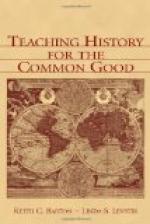The teacher should explain the value of remembering accurately the titles and the authors of books used for reference. The silly habit of referring to an authority as “the book bound in green” or “the large book by what’s his name” is easily prevented if taken in time.
The teacher should discover by assignments made in class what degree of proficiency in the use of an index is already possessed by his pupils. There are few classes where the use of an index is thoroughly understood. Time should be taken to demonstrate the quickest possible methods of finding what a book contains. The use of the catalogue and card index should be carefully explained and illustrated.
Attention should be called to the best sources on the various phases of the history to be studied. There ought to be no poor histories in the library, but if there are any to which the students have access, warning should be given against their use.
The value of periodicals and current literature for work in history should be illustrated and the use of Poole’s Index and the Readers Guide explained.
The class should be acquainted with the rules of the library and cautioned against the misuse of books. The necessity of leaving reference books where all the class can use them should be made apparent.
Direction in the use of the library, like instruction in the method of study, is a prerequisite to the best results in high school history classes, for no matter how conscientious the teacher, the recitation will be deadly if the student has no working knowledge of the library nor proper method of preparation. A class unable to ask intelligent questions about the work is not ready for the presentation of additional matter by the teacher. It is no difficult matter for a teacher to entertain his class for an hour with interesting incidents of the period in which the lesson occurs. A history teacher who cannot talk interestingly for an hour on any of the great periods of history has surely missed his calling. But to keep a class quiet, to retain their attention, to amuse and entertain, is far from making history vital. If the recitation is to be really vital, the students must do most of the talking, the criticizing, and the questioning. There can be none of these worth while without proper preparation.
III
THE ASSIGNMENT OF THE LESSON
Careful assignment will reveal to the student the relation of geography and history
The recitation can never hope to achieve its maximum helpfulness unless the lesson be intelligently assigned. The work required must be reasonable in amount, and not so exacting as to discourage interest. Daily direction to look up unfamiliar words, expressions, and allusions must be given until the habit becomes fixed. Warning against possible geographical misconceptions should be given when necessary, together




